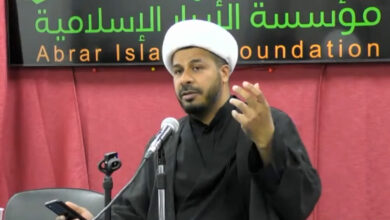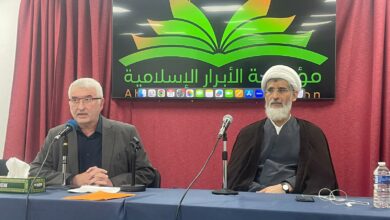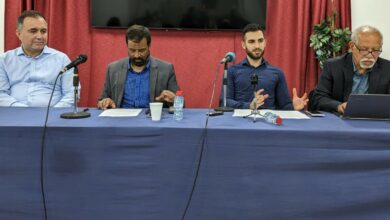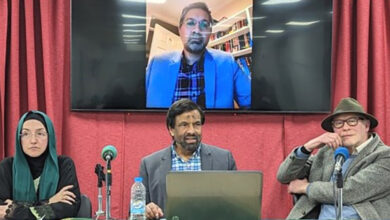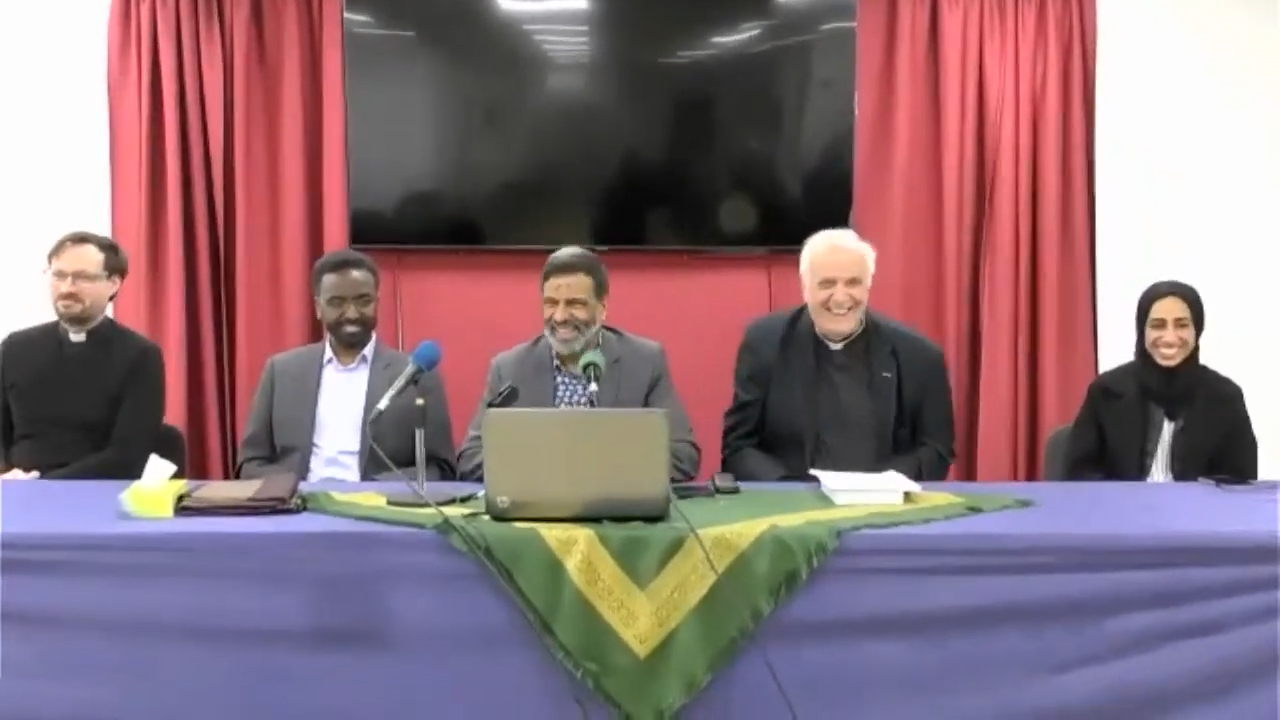
Religious fasting, personal & social morality
In Islam, fasting is a fundamental form of worship. It is linked to observing the moon during the month of Ramadan. It complements other forms of worship that aim at perfecting the lives of mankind. With growing consumerism gripping and shaping modern lifestyles, this single form of worship helps to cement a complete spiritual programme closely linked to the lives of mankind. Fasting is obligatory in Islam but is also enshrined in other faiths. For example, Lent is the solemn Christian religious observance in the liturgical year commemorating the 40 days Jesus Christ spent fasting in the desert and enduring temptation by satan. Fasting in Judaism is defined as total cessation from all food and drink. A full-day fast begins with sunset in the evening and continues through the darkness of the next day. Fasting in Judaism is defined as total cessation from all food and drink.
Dr Ali Abdul Rahim: The relationship between fasting and morality brings to mind the ongoing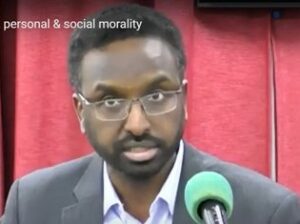 debate in legal theory about the relationship between law and morality. This is because, even in Sharia, there is a difference between matters of validity (sihha) in contracts, or sanctions for crimes, for example, and matters of morality such as honesty and piety.
debate in legal theory about the relationship between law and morality. This is because, even in Sharia, there is a difference between matters of validity (sihha) in contracts, or sanctions for crimes, for example, and matters of morality such as honesty and piety.
Consider the problem: does committing a grave sin (kabirah) such as murder or dealing in riba, void one’s fast? No, is the answer. Similar examples: going to Hajj with stolen money is a valid hajj but the act is a sin. Praying in a usurped land is valid but a sin. To understand this paradox, we need to understand the distinctions between law and morality in general, and between Islamic law, and
Law, broadly speaking, is defined as a system of rules that regulate relations in society. Morality is the standard by which we identify good and bad. Things can be immoral but legal, such as telling an offensive joke or lying to a friend; other acts may be illegal but not necessarily immoral, for instance, protestinging for a good cause such as the environment. Positivists argue that the law is valid if it satisfies the correct methods for validity, i.e. who validates and how. The content is irrelevant.
Religious law, on the other hand, is primarily formed around morality and values. Islamic law is defined by its sources and the content of these sources is a message of moral values. But when the law is applied, the issue of validity becomes a technical matter that requires the concise definition of religious duties. So, although fasting is a spiritual practice in which believers regulate their mundane pleasures more strictly to elevate their spiritual connection to God, fasting is technically defined as abstaining from food, drink, and sexual intercourse from dawn until sunset. Hence, fasting is valid unless these aspects are violated.
This brings us back to our previous problem. A person may commit a grave sin while fasting, but this does not invalidate his or her fasting. Law, even religious law that draws directly from sources of morality, can only go so far in achieving the required moral standard in society. Social pressure and personal conscience are the main pillars of morality.
Our prophet knew this well. He said: “If one does not abandon falsehood and action in accordance with it, God had no need that he should abandon his food and his drink.” And he said: “When any one of you gets up in the morning in the state of fasting, he should neither use obscene language nor do any act of ignorance. And if anyone slanders him or quarrels with him, he should say:” I am fasting, I am fasting.”
This level of morality cannot be achieved by legislation, it needs the powerful authority of the community of believers to applaud virtuous deeds and shame all mischief. And it needs the believer to be aware that fasting as a religious act is not the same as fasting in the legal (fiqh) sense. Fiqh tells us about the validity of fasting, about expiation (kaffarah), about crime and punishment, it shows us the technical side of religious practice, but that’s not the complete picture. We know that fasting remains valid even for someone who commits a grave sin.
It is upon the community of believers to emphasis the true meaning of fasting where the moral, rather than the formal, aspects of fasting are the measure. It is upon us, to frown upon a person who acts immorally more than we frown upon one who eats or drinks during the day of Ramadan. The latter is not harming anybody and they may have a legitimate excuse for their action (they maybe sick). But what excuse does a person who cheats in his trade, or is cruel to their spouse, or lies to their neighbour, have?
Morality is a system for the social domain, but worship is between God and his servant. We, as a community must not be too concerned whether an individual’s fasting is valid, we should, rather be concerned whether his fasting meets the moral standard for a fasting person. We should ask: did this person raise their moral standard during Ramadan? Did they change their behaviour for the better? And, of course, we should be asking the same questions to ourselves.
True fasting is far greater than mere valid fasting. True fasting that is likely to be accepted by Allah is fasting that would raise the standard of behaviour in the community as a whole, making it more generous, more compassionate, more pious, and more tolerable.
Fatima Al-Halwachi: Salam alaikum and good evening everyone. It’s a blessing that this holy month has brought us together here today.
has brought us together here today.
The road to God is a journey and through this journey, God has given us many stops where we can refresh ourselves, regain our energy, and move forward. Ramadan is one of those stops and the beauty of this journey is that it is constant until we reach that end goal (God).
Fasting is an act of worship observed in different religions: you have Christians fasting in lent we have Judaism who fast through different events there’s Buddhism and Hinduism also. fast. In Islam we fast from dawn to sunset and refrain from both water and food.
For those able, fasting encompasses many benefits both physical and psychological. Many studies have proven these benefits especially in regulating body weight blood pressure and cholesterol levels.
However, the spiritual benefits of fasting are just as important as the physical ones. Fasting during Ramadan is a time for self-reflection and introspection. It is a time to connect with our inner selves and to assess our spiritual well-being. It is a time to ask ourselves, “What kind of person am I? How can I improve myself? How can I become a better Muslim?” In a time where mental health issues are on the rise especially in our youth with 1 in 4 having a mental disorder in 2022 (NHS, 2022).
One of the most important spiritual benefits of fasting is the opportunity to increase our Taqwa. Taqwa is an Arabic word that means piety, fear of God, and consciousness of God. Fasting helps us to become more conscious of God and to increase our awareness of His presence in our lives. The Quran mentions this is the core reason why we fast:
Oh you who believe the fasts have been enjoined upon you as they were enjoined upon those before you so that you may be God-fearing (183) Baqara
When we fast, we are constantly reminded of our purpose and our dependence on God. This helps us to become more humble and more grateful for the blessings that we have in our lives.
Another important aspect of the spiritual benefits of fasting is that it helps us to cultivate discipline and self-control. By abstaining from food and drink during the daylight hours, we are training ourselves to control our physical desires and to develop greater self-discipline. This can have a positive impact on our everyday lives, helping us to become more patient, more focused, and more productive.
And last but not least fasting during Ramadan is also a time for community and fellowship. It is a time when Muslims come together to break their fasts, to pray together, and to share their experiences with one another. In a time where individualism is taking over bringing back a sense of community is much needed.
There is a beautiful saying in Nahjul balagha saying 142:
And how many of those who fast gain nothing but from their fasting except for hunger and thirst.
- remaining in our sinful habits means we will not gain anything
- the best thing to do in this month is to avoid the thing Allah has forbidden prophet (pbuh)
In conclusion, the spiritual side of fasting in Ramadan is just as important as the physical side. Fasting is a time for self-reflection, introspection, and spiritual renewal. It helps us to become more conscious of Allah and to increase our awareness of His presence in our lives. It also helps us to cultivate discipline, self-control, and humility. Finally, fasting is a time for community and fellowship, helping us to feel more connected to our fellow Muslims and to the larger Muslim community.
Revd Stephen Hearn: Thank you for your warm words of welcome. It is a great pleasure to be with you here this evening. It is interesting that you talked about validity and acceptability. We have some similar concepts in different kinds of Christian thinking about our religious obligations. The way in which we can satisfy the level of what is required.
you here this evening. It is interesting that you talked about validity and acceptability. We have some similar concepts in different kinds of Christian thinking about our religious obligations. The way in which we can satisfy the level of what is required.
In the Hebrew bible God is getting really angry with his people for observing all the outward requirements of fasting and celebration but without it having any real purchase in the life of the community and the individual believers.
I work now in a school having worked in a university as a chaplain. I work with the smallest of children right up to secondary school girls in the school in Marylebone High Street. They have been talking a lot about what are you giving up for lent and by giving up I think they feel this is the Lentin fast. This is not without merit but does not have real spiritual depth to it.
It is possible to be extremely vigorous in the observation of one’s Lentin fast and I have to say with humility that our observation of fasting is not nearly as vigorous as the Islamic observation of fasting as I understand. The idea is that this activity should grip our entire lives or change them. The Ramadan fast is a lot more rigorous than the Lentin fast.
But either way, the idea is the same that his outward activity, this way in which we use or do not use our bodies should have an inward effect. That all of this outward activity changes us within. And because it is not just a collection of individuals. We are all doing something at the same time, something that fundamentally happens within the Christian community as it prepares for the Easter feast. It is of course that the Lentin fast not only changes us as individual Christians but has a transforming effect on the whole community of believers.
I am not sure how perfect that experience is in many of the Christian communities to which I belong but there is a wonderful sermon by Sir John Cristin of the parable of Jesus of those who are the workers in the vineyard who have been toiling in the vineyard all day and at the end of the day they are paid the same as those who came at various intervals during the day. Even those who came towards the end of the working day all receive the same pay. Those who have been working long hours are very annoyed at this but the message is that the rewards of the spiritual life are available to all regardless of our efforts and so at Easter Cristin says welcome to those of you who have fasted and those of you who have not. The mercy of God is on all and of course, regardless of our effort, his love remains constant.
His love and mercy cannot be affected by our activity or by our actions. However, we miss something crucial if we decide that whatever we set out God will be merciful. In the Western world, we have come to think of morality as a kind of compliance with injunctions. The idea of what is moral is important and the content of the rules is secondary. They are rules in traditional Christian morality. However, we have a very similar idea that morality is attained by our participation in virtue which is to say the way in which our lives our conformed by the pattern set by us for God.
That is so profoundly true that we should read it in the natural world as well as in the way that any good community should arrange itself and the way in which you become a virtuous person in a kind of way fake it till you make it. It is a sort of Aristotelean idea that you can come to it by doing good things. You don’t have to wait to become good until you are someday overtaken by spiritual goodness. We begin with spiritual goodness and this then leads to action. Things begin with the act.
For me very often in Lent I begin my fast thinking I am failed to be a faithful Christian in all the ways that I know I ought but here is this opportunity to begin doing some things I know I should and pray that by God’s grace by doing the things I know I should that I begin to participate in the virtue of God and then that moral being in the world, that way of being which is natural to come alive in me. Christians hope that the exercise of that goodness will be perfected and we will be able to share the very life of God himself.
The Revd Frank Julian Gelli: The Roman emperor Decius was a pagan and a cruel persecutor of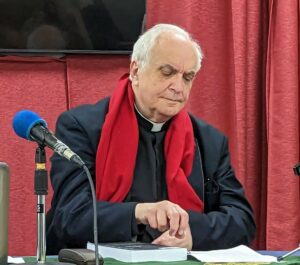 Christians. He fancied himself as very cunning. So he once summoned to his palace the elders of the Church and demanded of them: ‘Are you men of faith? Do you believe everything said in your Scriptures?’ ‘Yes, of course’, they replied. An evil grin came over Decius’ face. ‘Good. Do you see that mountain over there?’ he pointed through the window towards a big, blue mountain in the distance. ‘It says in your Gospel that if you have faith you would be able to move it. You have forty days to prepare. If you fail, I will exterminate you and all your people.’
Christians. He fancied himself as very cunning. So he once summoned to his palace the elders of the Church and demanded of them: ‘Are you men of faith? Do you believe everything said in your Scriptures?’ ‘Yes, of course’, they replied. An evil grin came over Decius’ face. ‘Good. Do you see that mountain over there?’ he pointed through the window towards a big, blue mountain in the distance. ‘It says in your Gospel that if you have faith you would be able to move it. You have forty days to prepare. If you fail, I will exterminate you and all your people.’
What did the Christians do? They immediately called for a general fast of their congregations, accompanied by constant, daily prayers and almsgiving. It was a very strict fast, with minimal eating drinking, lasting all day and night. When the appointed day came, Decius and his soldiers stood around, swords drawn, ready to make mincemeat of the Christians. After prayer and meditation, the elders together commanded the mountain: ‘Move!’ And, lo and behold, the blue mountain did indeed shift and visibly move. The believers were saved.
This pious story puts the meaning of Lent in a nutshell. It is a season for spiritual warfare. A time of combat, of resistance to the devi land all his dastardly wiles and works. Lent consists of forty days of exercise sin self-control, self-denial and in mastery over self. Indeed, Lent begins with the powerful rite of Ash Wednesday, when the people come to church to have their heads sprinkled with ashes, symbolising their renewed humility and utter submission to God.
Lent essentially harks back to a mighty event at the beginning of Jesus’ public ministry. St Matthew’s Gospel narrates that after his baptism in the river Jordan by St John the Baptist, the Spirit of God led Jesus into the wilderness, ‘to be tempted by the devil’. After the Messiah fasted forty days and forty nights, a tremendous metaphysical contest took place. According to the Russian writer Dostoevsky, the three temptations put by Satan to Jesus were of such spiritual depth and power that they are proof enough, if proof was needed, of the supernatural agencies at work in that awesome trial. Of course, the Messiah rejected the devil’s malicious seductions and soundly defeated him, praise be to God!
The Gospels say that some Jews criticised the Messiah when they saw his disciples not fasting. He then compared his own person to that o fa bridegroom at a wedding feast, at which fasting would be inappropriate. The point was that the historical presence of Jesus, the Christ of God, was better celebrated by feasting than by fasting. The Church acknowledges that truth by excluding Sundays in Lent from fasting. That is so because Sunday is the Day of the Lord, hence rejoicing and cheerfulness should be the keynotes, not gloom and penance.
During the early centuries of the Christian era ascetical practices such as mortification and fasting were also required as training and preparation for baptism, the sacrament that makes one a member of the Church. Of course, the forty days period climaxed with the celebration of Easter, the joyful festival of the Resurrection. The penitential aspect of Lent is therefore not an end in itself but a prelude to the final, decisive victory of Christ over the forces of evil and death. Again, the emphasis is on the good news. Eventually, penance and asceticism must give way to joy and bliss. There is perhaps a contrast with fasting in the Old Testament here, as fasting in the previous dispensation was connected with mourning over the destruction of the Jerusalem Temple.
Fast days outside Lent in the early church were usually Wednesdays and Fridays. Lenten fast was very strict. Only one meal a day, taken towards evening, was allowed. Any kinds of flesh-meat, fish, eggs, and even milk were absolutely forbidden. The severity of later fasting varied according to the particular church’s rules and customs. Also, members of religious orders, monks and nuns, have more obligations than ordinary laymen, because their vows entail more austere, extraordinary duties. Today the Ethiopian Coptic Church has the longest number of fast days in Christendom: 250 a year, 180 of which are obligatory for all. Surely a sign of great holiness.
Since the Reformation, Protestants have largely neglected ascetical practices and observances. It was a regrettable reaction caused by their break from the Catholic Church. Calvinists abandoned Lent altogether . Lutherans and Anglicans did not but they did not consider it especially meritorious. Since the Anglo-Catholic revival in the 19th century, Lent’s self-denial and austerities have partially been revived in the Church of England. In my own parishes, I always made a point of preaching about self-discipline and almsgiving, also exhorting the people to fast. Once we raised thousands of pounds for charity by collectively giving up dainties for Lent!
Naturally, Lent fights against temptations of the flesh, such as gluttony, binge drinking, and fornication. There are also temptations of the mind. They are perhaps the most difficult to tame. Abstaining for food is relatively easy but how do you refrain from anger, envy, and overweening pride? I myself knew a priest-monk who had a reputation for strict austerity and great simplicity of life – rare qualities for the often worldly and shallow clergy of my church. But once I noticed how envious he was of the success of a fellow priest. That temptation the holy man could not resist. I think I then saw Satan exulting by his side…
Mind, the holy season of Lent is not about self-help and human effort. Man can do nothing by himself. God’s grace is essential for fighting the Evil One. Lent calls believers to be better but any spiritual deed is vain if it is not prefaced by that beautiful, necessary phrase: ‘God willing’. Insh’allah.
*Fatima Al-Halwachi is a professional network engineer with more than 8 years experience in the field. She has a degree in Computer Science and currently works at Cisco. She is passionate about sharing knowledge from the Quran and truly implementing its teachings in our daily lives.
**Revd Stephen Hearn arrived in Marylebone in 2022 after ten years working at Oxford University: as Chaplain and Fellow of Exeter College, then as a senior manager in the University administration, and most recently as Chaplain of Mansfield College. He also served as Associate Priest of St Mary Magdalen Oxford. During this time, he undertook graduate work in the field of Literature and Theology, writing a thesis on Ralph Waldo Emerson, and studied psychoanalytic theory and practice with the British Psychotherapy Foundation. Stephen grew up in London and Hampshire and read English at Oxford, specialising in medieval languages and literature. A keen musician, he was an alto choral scholar at Magdalen College and conducted The Oxford Chamber Choir. After graduation, he was Warden of the Lincoln diocesan retreat centre, and continued to sing as a lay clerk in the in the cathedral choir. He returned to Oxford to read Theology and train for the priesthood at St Stephen’s House, spending his final year as a visiting seminarian at the Venerable English College in Rome. Stephen was ordained in Lincoln Cathedral in 2009 and served as curate of Market Deeping before taking up his first post in Oxford. Fr Stephen is a passionate follower of the England Cricket team and an ardent Wagnerite.
***Dr Ali Abdul Rahim is an academic at SOAS University. He holds a PhD in the Philosophy of Sharia from the University of London and a Masters Degree from Cambridge in Economics and International Development. He published several books on Islamic issues and also on Sudan’s politics. He also worked with economic and business institutions. Dr Ali is well-versed Islamic and Middle Eastern studies expert, with an outstanding track record of writing and publications. His research Interests include: Islamic Studies, Development Studies, Politics and Law. Dr Ali is also a human rights advocate focusing on the relationship between Religion, Law, Politics, and Development.
****The Revd Frank Julian Gelli obtained a BA in Philosophy from Birkbeck College, London, an MA in Christian Ethics as well as a PGCE, both from Kings College, London. He also holds an Oxford University Certificate in Theology. Three years ago he obtained an MA in Islamic Studies from the Muslim College, London. In 1986 he was ordained as Anglican priest. He served in London parishes, as well as a chaplain to the Church of St Nicholas, British Embassy, Ankara, Turkey. From 1999, Father Frank has devoted himself to writing and to interfaith dialogue. He has lectured on interfaith in the US, Switzerland, Italy, Germany, Turkey and Qatar, where he was Visiting Fellow at the Family Institute, Qatar University. He often takes part in interviews and discussions on TV Channels like Press TV, Ahlulbayt TV and Islam Channel. He has three books available online. ‘Husayn at Karbala: The Enduring Struggle’, ‘Julius Evola, the Sufi of Rome’ and ‘The Dark Side of Britain’. His next book will be ‘The Qur’an and the Art of Problem-Solving’.

